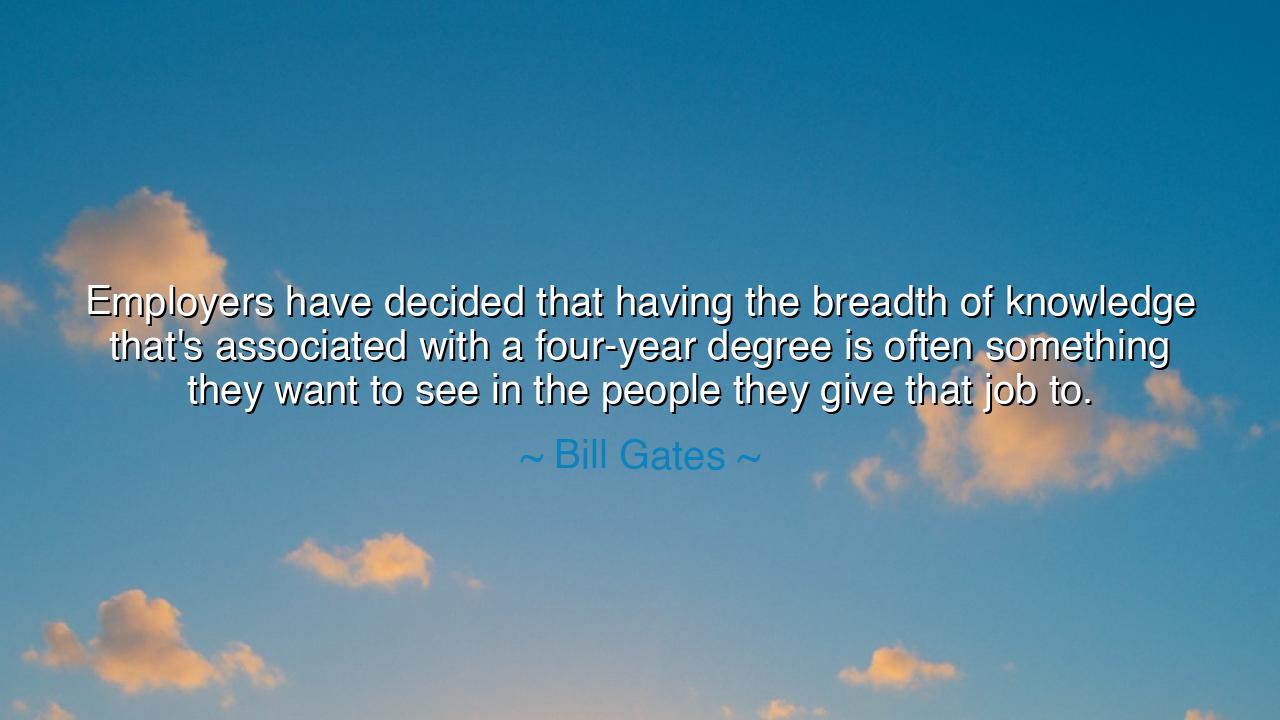
Employers have decided that having the breadth of knowledge
Employers have decided that having the breadth of knowledge that's associated with a four-year degree is often something they want to see in the people they give that job to.






The words of Bill Gates resound with the wisdom of both the scholar and the builder of empires: “Employers have decided that having the breadth of knowledge that's associated with a four-year degree is often something they want to see in the people they give that job to.” In this statement lies a recognition of civilization’s eternal law — that knowledge is a mark of readiness, a sign not merely of skill, but of discipline, endurance, and mental expansion. The ancient world revered those who could think broadly, for the mind that can roam across many fields is the mind that can solve the problems of the age.
To understand the origin of these words, one must look not to universities themselves, but to the evolution of human learning. From the academies of Athens to the monasteries of medieval Europe, education was not only the training of the mind but the refinement of the soul. The breadth of knowledge — the ability to see connections between philosophy, mathematics, and the natural world — was what separated the philosopher from the craftsman. When Gates speaks of this breadth, he echoes this ancient ideal: that true wisdom lies not in one narrow art, but in the harmony of many.
Yet this insight also arises from the crucible of modern experience. Gates, a man who himself left the university before earning a degree, does not praise the diploma as a mere credential, but as a symbol of intellectual range. Employers — the stewards of opportunity in our time — seek not only those who can execute a task, but those who can comprehend the greater tapestry in which that task resides. A four-year degree, in its best form, signifies that the bearer has wandered through history, logic, art, and science — that they have glimpsed how one truth illuminates another. It is not the parchment that is precious, but the breadth of understanding it represents.
Consider the story of Leonardo da Vinci, the master of masters, who was as much a painter as a mathematician, as much an engineer as a philosopher. His genius was not the product of one discipline but the fusion of all. When he drew the “Vitruvian Man,” he united anatomy with geometry, proportion with divinity. This is the breadth Gates refers to — the kind of mind that employers, leaders, and civilizations themselves depend upon. For in times of change, it is not the narrow specialist but the broad thinker who adapts and leads.
The breadth of knowledge also serves as a shield against arrogance and blindness. When a man studies many disciplines, he learns humility — for he sees how vast the universe is, and how small his own understanding. Such a mind is fertile, open to correction, capable of synthesis. It is no wonder that the wise employer values such breadth: a team built upon diverse minds is like a city built upon strong foundations, each stone supporting the other. The narrow mind builds a wall; the broad mind builds a bridge.
But Gates’s words carry another, deeper challenge: to those who have not walked the formal path of a four-year degree. He does not condemn them. Instead, he reminds them that the spirit of education must live on, with or without the institution. For in truth, a degree is not the only way to attain breadth. It is the love of learning — the restless curiosity that reads, observes, questions, and connects — that creates the same expansion of mind. The self-taught and the university-trained are brothers in the same temple of wisdom, if both seek to understand the world in its wholeness.
Let this teaching, then, be taken to heart: seek breadth, not just depth; cultivate wisdom, not just skill. Whether through the halls of a university or through the corridors of life itself, strive to know beyond your trade. Read history if you are an engineer; study nature if you are a poet. The world hungers for those who can see patterns where others see fragments, who can lead with understanding, not just efficiency.
Thus, the lesson of Bill Gates is timeless: the path to opportunity is paved by the cultivation of a broad and disciplined mind. Employers may look for a degree, but what they truly seek is the light of comprehension — a mind that has walked through many doors and emerged wiser from each. Be such a mind. Study not for the certificate, but for the awakening. For when knowledge deepens and widens, the world itself opens its gates before you.






AAdministratorAdministrator
Welcome, honored guests. Please leave a comment, we will respond soon